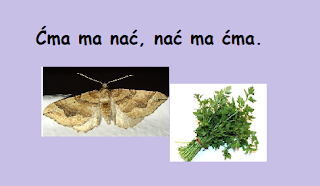EVERY LANGUAGE HAS ITS DARK SIDE… OF PRONUNCIATION
When we begin our adventure with learning a foreign language, apart from practical phrases and expressions, we are bound to encounter tongue-twisters. Such combinations of words are usually very difficult to repeat and every language has that “something” that causes serious problems with pronunciation.
Among many of the foreigners learning Polish there is a widespread conviction that this language has very complex phonetics. Well, if you happen to overhear Polish people talking to each other on the streets, you might, indeed, conclude that they are making some sort of whistling and crackling sounds. The popular tongue-twisters that your Polish acquaintances tend to use to “frighten” the foreigners, only seem to prove that notion.
POLISH IS NOT AS HORRIBLE AS IT MAY SEEM
Don’t be scared, though! During a Polish language course, especially the one for beginners (if you are looking for a good course, you should definitely look here), you won’t need to repeat the famous verses about a beetle making sounds in the reeds in Szczebrzeszyn (pol. chrząszcz brzmi w trzcinie w Szczebrzeszynie) or about the postmaster from Tczew dancing cha-cha (pol. poczmistrz z Tczewa tańczący cza-czę). In fact, tongue-twisters, in spite of their name, are not meant to twist or break your tongue, and even less so to discourage you from learning, but to practice what’s difficult and troublesome. That is why you shouldn’t be afraid of them. You simply need to get used to the sound of the language first, and then practise phrases and words which are of more practical use, such as Jak się pan nazywa? rather than the abovementioned chrząszcz or piegża (white-throated warbler). Only then, just for fun, can you try to repeat some of the Polish tongue-twisters. And there are quite a few of them.
A CHALLENGE NOT ONLY FOR A FOREIGNER
We shouldn’t forget that these tongue-twisters have appeared not without a reason and some of them are a great challenge even for the native Polish speakers. All consonant clusters that are pronounced with such beautiful whistling and whishing are not hard for native speakers to pronounce as long as they appear in separate words. However, when too many of such words come together, they Poles might “over-whish it” and instead of saying: Sasza szedł suchą szosą (Sasha was walking along a dry road), you’ll get something like: Szasza szedł szuszą szoszą.
It is just as hard to pronounce the words such as artyleria (artillery), artyleryjski (adjective derived from the noun artillery) or rewolwer (revolver). In the Polish language “r” and “l” are close in articulation point (by the way, artykulacja is another difficult word) and therefore it’s easy to make a mistake.
More Polish tongue-twisters and interesting facts about the Polish language you can find on our FB profile
So, if any of your Polish acquaintances asks you to repeat: cesarz czesze cesarzową, a cesarzowa czesze cesarza (the emperor is combing the empress and the empress is combing the emperor), you can suggest that you will give it a try, but in exchange you should ask them to repeat: król Karol kupił królowej Karolinie korale koloru koralowego (king Karol has bought a bead necklace of coral colour for queen Karolina). You can rest assured that it’s not going to be an easy task.
Let’s not forget that most Poles have been learning these tongue-twisters all their lives. When they rattle them off without pausing for breath, you can be sure they have done it many times before.
And if you want to pleasantly surprise both the Poles and foreigners speaking Polish, it is enough, while spending time in your cosy domesticity, to memorize one of such tongue-twisters (in case of difficulties just ask your teacher for help), and then to show what you can do. And then, it will turn out that Polish is easy after all (and especially so, when you learn it at Po Polsku)!

